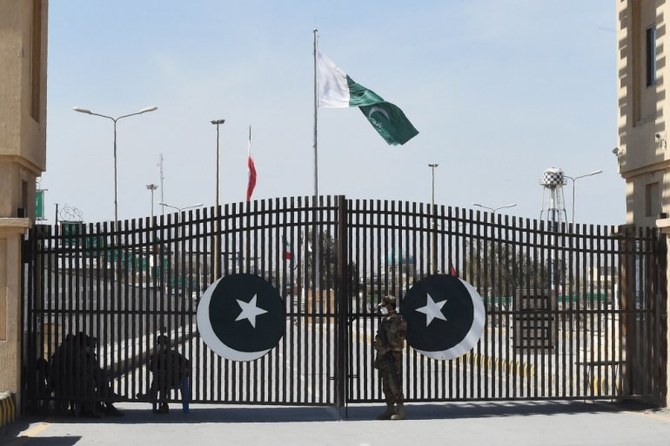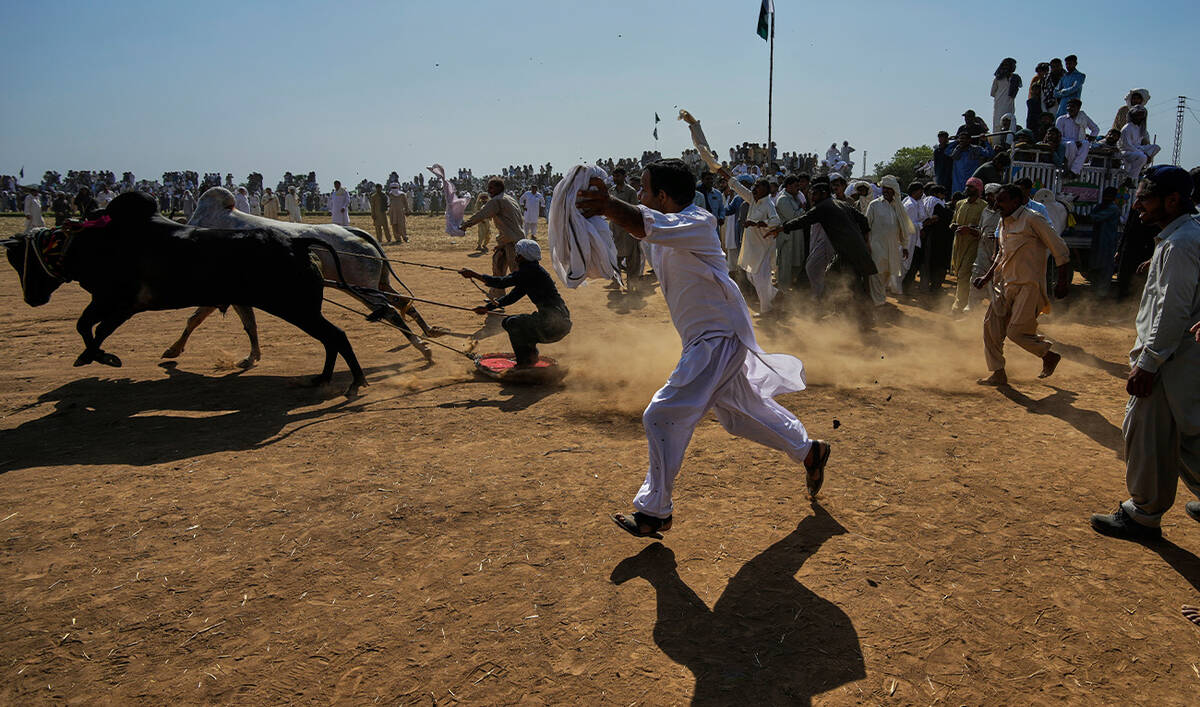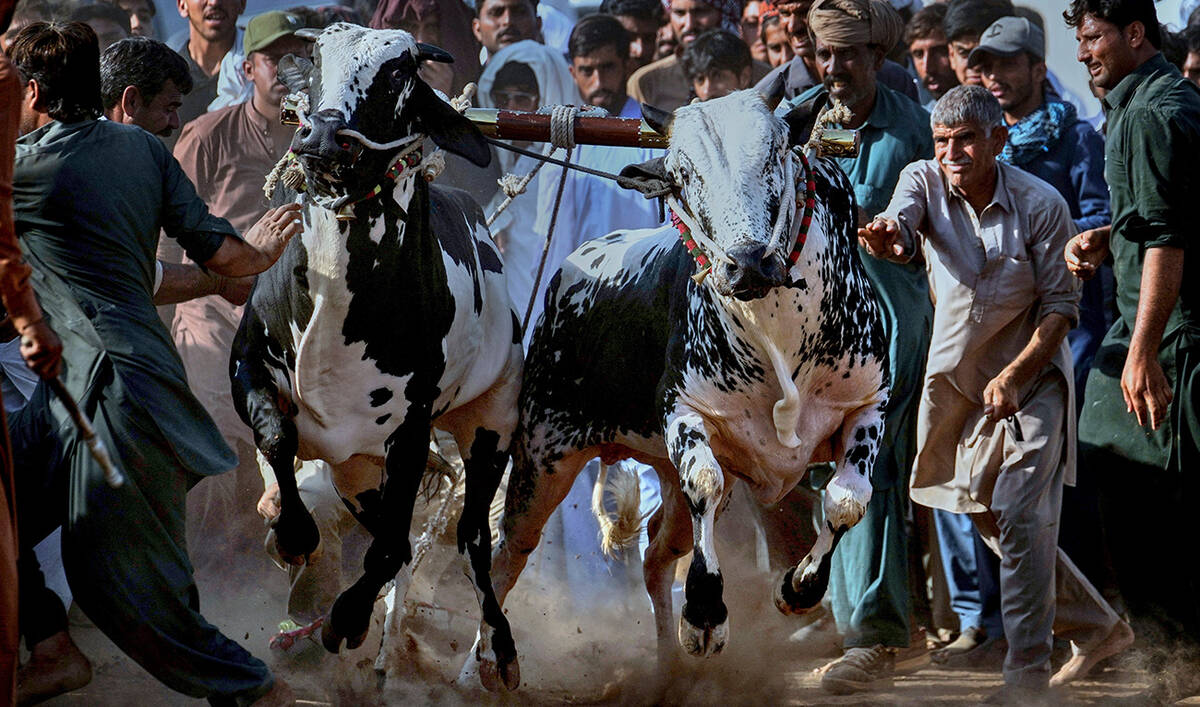KARACHI: Pakistan on Tuesday hinted that it was open to “constructive diplomatic and economic engagement” with India as the International Monetary Fund (IMF) said prevailing tensions between the two archfoes had increased enterprise risks to Islamabad’s ongoing loan program.
The development comes days after Indian Defense Minister Rajnath Singh said the IMF should reconsider a $1 billion loan to Pakistan alleging it was “funding terror,” a move denounced by Islamabad as proof of New Delhi’s desperation.
India and Pakistan this month clashed in the worst military violence in decades, killing around 70 people before agreeing a ceasefire on May 10. The conflict was sparked by an attack on tourists in Indian-administered Kashmir that New Delhi blamed on Islamabad, a charge it denies.
Khurram Schehzad, adviser to Pakistan’s finance minister, said the Washington-based lender had not imposed any new “conditions” on Pakistan, which continues to pursue stability and responsible governance that supports long-term growth for itself and the region alike.
“Constructive diplomatic and economic engagement in the region, including with neighbors, remains essential,” Schehzad told Arab News, when asked about the recent developments on the fiscal front.
The IMF last week approved a loan program review for Pakistan, unlocking a $1 billion payment which the State Bank of Pakistan said had been received. A fresh $1.4 billion loan was also approved under the IMF’s climate resilience fund.
But the lender last week said the rising India-Pakistan tensions, if sustained or deteriorated further, could heighten enterprise risks to the fiscal, external and reform goals of its $7 billion ongoing loan program for cash-strapped Pakistan.
The IMF loan is vital for Pakistan which is trying to revive its debt-ridden economy that is expected to expand 2.68 percent by June, about one percent lower than the government’s earlier projection.
“Yes, the IMF report identifies regional tensions as a potential risk, as is customary in such assessments,” Schehzad said, adding that at the same time, the Fund had noted that Pakistan’s stocks market had reacted to the conflict modestly and retained most of its recent gains.
“We view this as a reflection of investor confidence in Pakistan’s macroeconomic path.”
Pakistan’s stocks, which rose more than 80 percent last year, have largely resisted selling pressures in recent weeks, despite the country’s conflict with India that saw the two sides strike each other with missiles, drones and artillery.
Schehzad rejected the impression that Pakistan had increased its defense budget and said it remained constant at 1.9 percent of the gross domestic product this fiscal year starting in June 2024.
“The Rs2.414 trillion defense budget cited in the IMF’s staff report is an absolute projection,” he said.
After debt servicing, defense spending is the second biggest drain on Pakistan’s revenues that the country is trying to improve by withdrawing energy subsidies and taxing incomes from agriculture, retail and real estate sectors as one of the conditions set by the IMF under its 37-month Extended Fund Facility (EFF) secured in September.
BUDGET DISCUSSIONS
An IMF team is currently discussing with Pakistan the upcoming federal budget that the country is expected to unveil early next month, said IMF officials privy to the discussions, requesting anonymity as they were not authorized to speak to media.
The talks are expected to conclude “this week” after which the IMF would issue a concluding statement, they told Arab News, without explaining what exactly the two sides were discussing.
The IMF’s latest country report, issued last week, mentioned certain structural benchmarks for Pakistan’s economic reform program that Schehzad said represented the natural progression of the measures already agreed upon, when Pakistan signed the Memorandum for Economic and Financial Policies (MEFP) in September.
“There are not newly introduced conditions. Each step builds logically on the foundations laid in earlier phases of the program,” he said, adding that each structural benchmark the IMF’s report mentioned was part of a sequenced approach to reforms that was designed in phases and built upon progress achieved in the country’s earlier reviews.
Pakistan on May 9 secured the IMF board’s nod for its first review that saw the release of about $1 billion to the cash-strapped country and the approval of the country’s request for a 28-month, $1.4 billion Resilience and Sustainability Facility (RSF) to cope with environmental vulnerabilities.
“These benchmarks are not surprises. They are deliberate follow-ons to earlier milestones,” Schehzad said, citing Pakistan’s parliamentary approval of the next budget in line with the IMF staff agreement as a second step toward the country’s goal of achieving a primary surplus of 2 percent of GDP by FY27.
“The first step was the FY25 budget [presented in June last year], which targeted a 1.0 percent surplus.”
Terming several other IMF structural benchmarks as a continuation of what has been agreed upon with the lender, Schehzad said some new benchmarks were introduced in response to recent developments.
“The plan to publish a post-2027 financial sector strategy and the move to remove the cap on the debt service surcharge are based on new realities, including the recent constitutional amendment and the government’s evolving energy sector reform strategy,” he said.
Other reforms, according to the adviser, included phasing out incentives in Pakistan’s special technology zones and industrial parks by 2035 to ensure a level-playing field, and lifting a ban on the import of used cars to reduce trade barriers was consistent with the trade liberalization goals outlined in the September 2024 MEFP.
The finance adviser confirmed that the remaining 13 actions fall under the separate climate resilience-focused facility, RSF, that were approved by the IMF’s executive board.
“These measures reflect Pakistan’s steady and sovereign commitment to economic reform and transparency, not externally imposed demands,” he said.



















